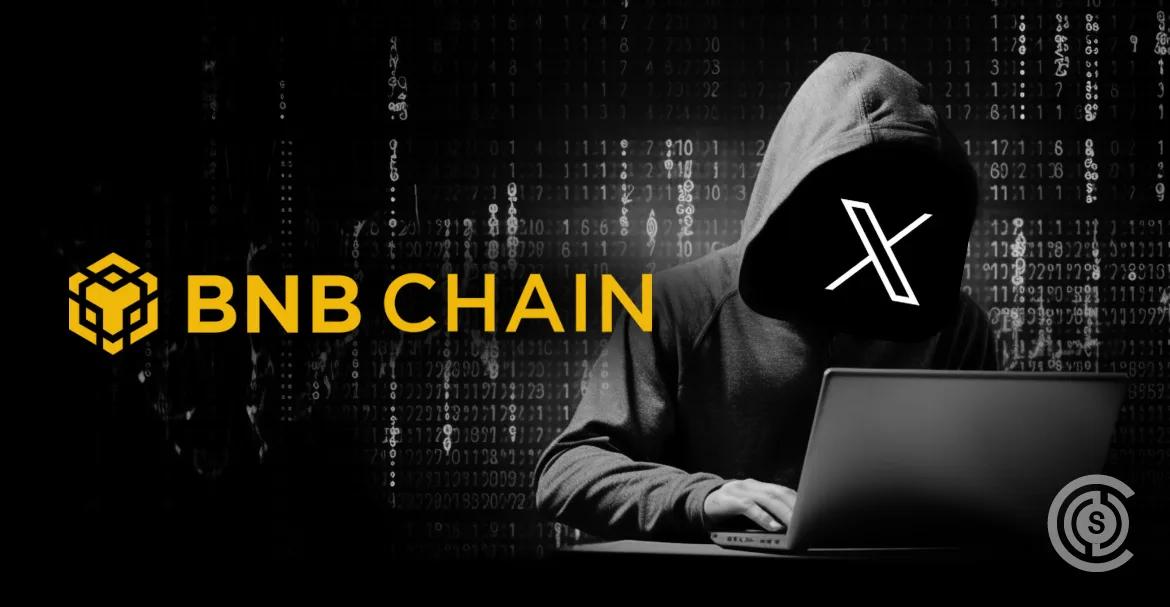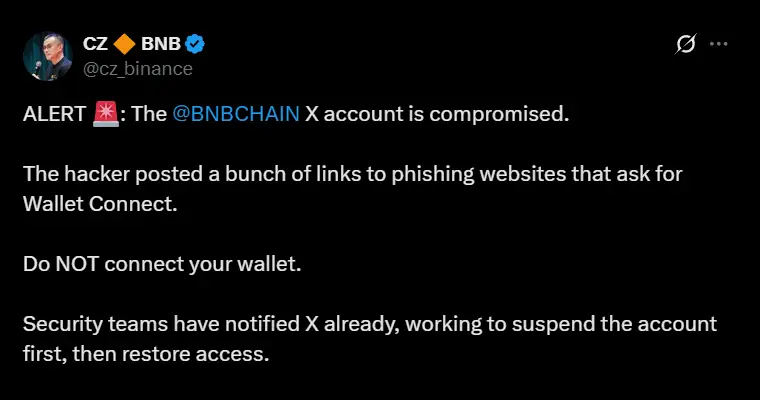Official BNB Chain X Account Hacked, Phishing Links Posted

Key Highlights:
- BNB Chain’s official X account was hijacked today and the compromised account has been posting phishing links.
- Binance’s security team is actively working with X to suspend the compromised account.
- 2025 has already seen record crypto thefts with over $2.17 billion stolen so far.
The crypto world has sent a stark reminder on how scary the crypto space can be, the official X (formerly known as Twitter) account of BNB Chain, a well-known blockchain network that is linked to Binance, has been hacked earlier today, October 1, 2025. The breach quickly triggered a flood of phishing attempts targeting regular crypto users.
The hackers took over the BNBChain account and started sharing harmful links that looked like real offers. These links took people to fake websites. These websites are designed to trick them into using WalletConnect, a tool normally used to link crypto wallets with apps.
The goal for the hackers was simple: if someone connected their wallet on these fake sites, the hackers would immediately gain access and steal their funds.
Binance Confirms Incident, Issues Warning
Binance’s former CEO Changpeng Zhao (CZ) addressed the situation directly after the hack. He tweeted on social media platform X and confirmed the news of a compromised BNBChain account.

CZ, in his post on X, also stressed that scammers are very adaptive and constantly looking for opportunities to spread phishing links. The former CEO of Binance has urged his community to stay alert, and has asked the users to double-check the domains that are being used. He also urged the users to avoid connecting wallets to suspicious sites, no matter how legitimate they appear to be.
Wallet Connect Used as a Trap
The phishing attack used a trick that disguised harmful links as a part of WalletConnect, a tool that is normally trusted and widely used by decentralized applications (dApps) to link wallets. Because WalletConnect is so common, users were easily fooled into thinking they were simply approving a regular transaction.
But once the approval was provided, the hackers could immediately access the wallet and take assets like tokens and NFTs. This left victims exposed to heavy financial losses.
Experts are warning the community that this type of scams are becoming more and more frequent in crypto. Instead of making fake accounts, attackers directly hijack real and trusted channels to push phishing links. This makes the scams more convincing. The breach of Binance’s BNB Chain account is a clear example of how risky it is to rely on social media for Web3 security.
Binance Response and Recovery Steps
According to the post by CZ, Binance has confirmed that the attack has not affected any internal systems or the blockchain network in any way, only the BNB Chain’s X account was compromised. Binance and X are currently working together to solve this matter and regain control of the compromised account. Binance has also filed urgent take down requests for these phishing links as well.
If the users have clicked on any of the phishing links by mistake, they should review their browsing history and check their wallet activity. They should also revoke any unknown approvals and stay alert for unusual transactions.
Record Crypto Hack Losses Linked to Social Media Breaches
Crypto-related hacks on social media and platforms have surged in recent years. According to Chainalysis and other security firms, more than $2.17 billion have been stolen by mid-2025, which has already surpassed the total loss in 2024. Around 23% of these thefts specifically targeted individual users through tactics like compromised social media posts and WalletConnect phishing links.
The famous Bybit hack, that occurred back in February 2025, caused a loss of $1.5 billion dollars. In this incident, multi-million dollar wallets were drained due to malicious links shared from hijacked accounts. Analysts warn that the rise of these attacks that blend social engineering with account takeovers means that even experienced crypto users remain at serious risk.
Also Read: Scandinavian & Nordic Gaming Show 2025: Regulation & Innovation


